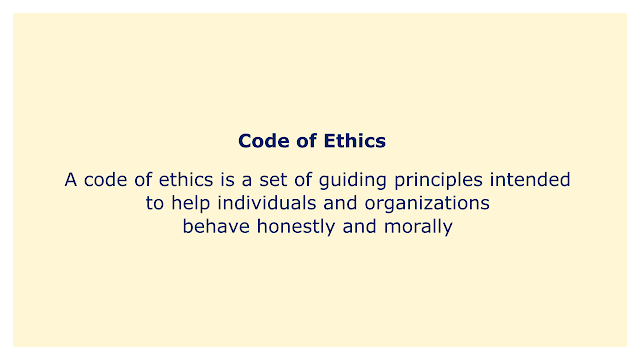 |
| Image: Moneybestpal.com |
A code of ethics is a set of guiding principles intended to help individuals and organizations behave honestly and morally. A code of ethics outlines the moral standards and best practices that a company should adhere to in order to be honest, ethical, and professional. A code of ethics document may describe the organization's mission and values, the standards that must be met by professionals working for the business, and the ethical obligations of the organization to its stakeholders, including customers, employees, suppliers, regulators, and the general public.
For a number of reasons, a code of ethics is crucial. The first benefit is that it contributes to the development of a moral and ethical workplace culture, which can improve an organization's reputation, output, and productivity. By setting clear and consistent standards and guidelines, it also helps to avoid or resolve ethical conflicts and dilemmas that might occur during the course of business. Thirdly, it assists in making sure that the necessary laws, rules, and industry standards that control company activity are followed.
The kind, scope, and sector of the organization, as well as the particular ethical problems and difficulties it faces, can all influence the code of ethics. However, some common elements and principles that may be included in a code of ethics are:
- Respect: The quality of treating people with decency, fairness, and kindness as well as respecting their privacy, rights, and diversity.
- Honesty: Speaking the truth in love, avoiding deceit, fraud, and misrepresentation.
- Integrity: Upholding one's obligations and promises while acting in accordance with the organization's beliefs and principles.
- Responsible: Taking ownership of one's decisions and actions and accepting the results of those actions.
- Quality: Delivering high-quality goods and services that satisfy customers' requirements and expectations, if not going above and above those standards
- Competence: Keeping up with professional knowledge and abilities, receiving feedback, and striving for improvement.
- Confidentiality: Safeguarding the organization's and its stakeholders' private information and only disclosing it when necessary or permitted by law.
- Loyalty: Maintaining fidelity and loyalty to the organization and its objectives while avoiding conflicts of interest or undue influence
- Justice: Behaving fairly, impartially, and without bias or favoritism
- Citizenship: Understanding and upholding societal laws, rules, and customs while also making contributions to the social and environmental well-being of the community
A code of ethics is a behavior as well as a written document. From senior management to front-line employees, it requires the dedication and involvement of every member of the business. In order to reflect the shifting conditions and demands of the business environment, it also needs to be reviewed and updated on a regular basis. A code of ethics can only be effective if it is upheld, maintained, and supported by standardized procedures for reporting, looking into, and disciplining ethical transgressions. To aid the organization's members in understanding and putting the code into practice on a daily basis, a code of ethics can also be used in conjunction with other tools and resources like training, education, counseling, and mentorship.
